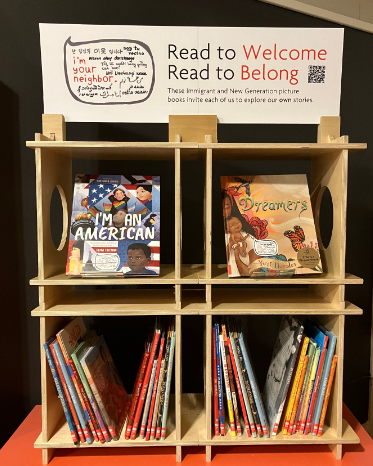
The Maine DOE has partnered with the non-profit I’m Your Neighbor Books to bring two incredible resources to every district in the state: the Welcoming Library: Pine Collection and the Pine Professional Development series.
The Pine Project uses two innovative tools created by the nonprofit I’m Your Neighbor Books to help educators and students navigate Social Emotional Learning. The first is the Welcoming Library: Pine Collection, a selection of 30 picture books with embedded SEL-aligned discussion questions featuring the experiences of immigrant families and their new generations. Public schools across Maine were allocated a library and were shipped directly to superintendents' offices.
The second is Pine Project: Professional Development, which is self-guided training on using the featured picture books to teach self-awareness, self-management, social awareness, relationship skills, and responsible decision-making.
We aim to enhance understanding of diverse experiences and foster inclusive school environments. We extend our deepest gratitude for your persistence, dedication, and commitment to fostering inclusive learning environments. Together, we will make a lasting impact and help every student thrive.

The Pine Project has been entirely Maine-based. The collections have been curated by I’m Your Neighbor Books, a Maine nonprofit, containing books by Peaks Island author Anne Sibley O’Brien and audiobook-enhanced titles provided by Portland’s AudioFile Magazine. The libraries sit on a bookshelf designed by Biddeford’s Nomak Design, manufactured by Lisbon Falls’ Orion Woodworking, and topped with signage from South Portland’s Banacom Sign. Martin’s Point Health Care Volunteers packed each set of books and bookshelves with custom packaging designed by Biddeford’s Volk Packaging.
Pine Project FAQs
The Welcoming Library modules are designed for your professional development and guided by the CASEL framework. We encourage you to engage with them sequentially, taking time to reflect and participate in the reflection opportunities before advancing to the next module. Revisit unfamiliar topics as needed or explore further using your favorite search engine. These modules are an open invitation—no RSVP required.
In any way you choose. The Welcoming Library is designed to be a shared district resource. The reusable crates and cardboard inserts allow you to pack, transport, and loan the Welcoming Library to any staff member in your district. Your district librarians may be the best placed to design a loan system for the Welcoming Library.
Explore the book collection. Each acclaimed picture book has companion discussion questions affixed to the book’s back pages. Based on core CASEL tenants, these questions are designed to foster valuable conversations among students and educators.
Reflection opportunities are built into the modules to encourage deeper thinking and personal engagement with the content. They prompt educators to pause, consider their own experiences and perspectives, and make connections between the material and their teaching practice. By reflecting on key concepts, participants can enhance their understanding and apply insights to foster inclusive, supportive learning environments.
ESSERF (CRRSA and Emergency) funds received from the US Department of Education (USDOE) support the implementation of this project. The contents are those of the author(s) and do not necessarily represent the official views of, nor an endorsement by, the USDOE or the U.S. Government.
Contact
Melanie JunkinsMultilingual and Bilingual Education Specialist
Email: Melanie.Junkins@maine.gov